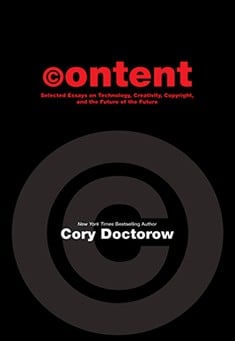Selected Essays on Technology, Creativity, Copyright, and the Future of the Future.
Hailed by Bruce Sterling as "a political activist, gizmo freak, junk collector, programmer, entrepreneur, and all-around Renaissance geek," the Internet's favorite high-tech culture maven is celebrated with the first collection of his infamous articles, essays, and polemics. Irreverently championing free speech and universal access to information--even if it's just a free download of the newest Britney Spears MP3--he leads off with a mutinous talk given at Microsoft on digital rights management, insisting that they stop treating their customers as criminals. Readers will discover how America chose Happy Meal toys over copyright, why Facebook is taking a faceplant, how the Internet is basically just a giant Xerox machine ...
Excerpt:
(Originally given as a talk to Microsoft’s Research Group and other interested parties from within the company at their Redmond offices on June 17, 2004.)
Greetings fellow pirates! Arrrrr!
I’m here today to talk to you about copyright, technology, and DRM [digital rights management]. I work for the Electronic Frontier Foundation on copyright stuff (mostly), and I live in London. I’m not a lawyer — I’m a kind of mouthpiece/activist type, though occasionally they shave me and stuff me into my Bar Mitzvah suit and send me to a standards body or the UN to stir up trouble. I spend about three weeks a month on the road doing completely weird stuff like going to Microsoft to talk about DRM.
I lead a double life: I’m also a science fiction writer. That means I’ve got a dog in this fight, because I’ve been dreaming of making my living from writing since I was twelve years old. Admittedly, my IP-based biz isn’t as big as yours, but I guarantee you that it’s every bit as important to me as yours is to you.
Here’s what I’m here to convince you of:
1. That DRM systems don’t work
2. That DRM systems are bad for society
3. That DRM systems are bad for business
5. That DRM is a bad business-move for MSFT
It’s a big brief, this talk. Microsoft has sunk a lot of capital into DRM systems, and spent a lot of time sending folks like Martha and Brian and Peter around to various smoke-filled rooms to make sure that Microsoft DRM finds a hospitable home in the future world. Companies like Microsoft steer like old Buicks, and this issue has a lot of forward momentum that will be hard to soak up without driving the engine block back into the driver’s compartment. At best I think that Microsoft might convert some of that momentum on DRM into angular momentum, and in so doing, save all our asses.
Let’s dive into it.
1. DRM systems don’t work
This bit breaks down into two parts:
1. A quick refresher course in crypto theory
2. Applying that to DRM
Cryptography — secret writing — is the practice of keeping secrets. It involves three parties: a sender, a receiver, and an attacker (actually, there can be more attackers, senders and recipients, but let’s keep this simple). We usually call these people Alice, Bob, and Carol.
Let’s say we’re in the days of Caesar, the Gallic War. You need to send messages back and forth to your generals, and you’d prefer that the enemy doesn’t get hold of them. You can rely on the idea that anyone who intercepts your message is probably illiterate, but that’s a tough bet to stake your empire on. You can put your messages into the hands of reliable messengers who’ll chew them up and swallow them if captured — but that doesn’t help you if Brad Pitt and his men in skirts skewer him with an arrow before he knows what’s hit him.















